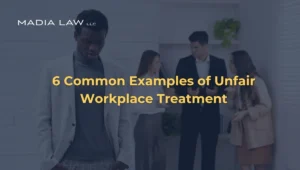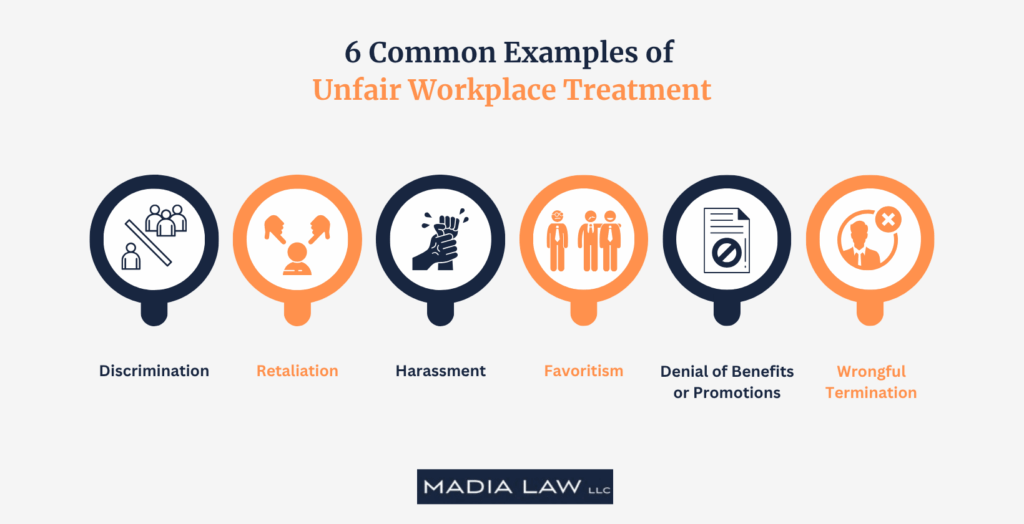
Being subjected to unfair treatment at work is not always obvious, and in certain instances, it crosses the line into the territory of being illegal. Some actions by employers or coworkers can overstep what is allowed by law, especially when they involve protected traits like race, gender, age, disability, or religion.
You may feel overlooked, singled out, or excluded, and at these times, wonder if it is just “office politics” or something more serious. The truth is, certain behaviors are not just morally wrong; they may violate federal and Minnesota employment laws.
At Madia Law, we have worked with thousands of employees in the Twin Cities and across Minnesota who faced these exact situations, often without realizing their rights were being violated. As a courtesy to our hardworking Minnesotan neighbors everywhere, we have put together this list of 6 common examples of unfair workplace treatment. If any of these sound familiar, it may be time to take a closer look at your protections and, with the assistance of a qualified Minnesota workplace discrimination lawyer, decide what steps make sense to take next.
1. Discrimination
Discrimination occurs when your employer makes decisions based on who you are instead of what you have accomplished. It can manifest in subtle or blatant ways, such as being excluded from key meetings, overlooked for promotions, or being held to a different standard than others. If those actions are tied to protected traits like race, gender, age, disability, religion, or national origin, then they are illegal.
Example: You have been consistently passed over for promotions, even though you are more qualified than others being promoted who might be individuals of a different race, gender, or age group. It feels personal. And it might be unlawful.
Federal laws like Title VII of the Civil Rights Act and the Age Discrimination in Employment Act (ADEA) exist to prevent this exact kind of injustice. If your background is being used explicitly or implicitly to deny you opportunities, you may have the right to file a legal complaint.
At Madia Law, we help employees in Minneapolis and across the state of Minnesota recognize discrimination when it is happening and take powerful legal steps to stop it.
For a legal consultation, call 612-349-2729
2. Retaliation
Retaliation happens when your employer punishes you for doing the right thing. Examples include:
- Reporting harassment
- Flagging unsafe conditions
- Requesting medical leave or disability accommodations
- Supporting a coworker’s complaint
- Filing a discrimination complaint.
It often follows a commonly seen pattern: once you have spoken up, the tone of your employer suddenly or gradually shifts. If your workplace becomes hostile or your role changes after you speak up, that might not just be a coincidence. Other telltale signs include ratings drops in your latest performance reviews, exclusion from meetings, changes to your schedule, or veiled threats to your job security.
Federal laws, including Title VII of the Civil Rights Act and protections under OSHA (Occupational Safety and Health Administration), make it unlawful for employers to retaliate against workers who assert their rights.
We often hear from employees who blame themselves or feel they should have stayed quiet. But retaliation is not something you have to accept lying down. If you have faced negative consequences for standing up for yourself or someone else at work, you may be entitled to legal protection and the right to hold your employer accountable.
If you have faced negative consequences for standing up for yourself or someone else at work, you may be entitled to legal protection and the right to hold your employer accountable. Speak with our Minneapolis retaliation lawyer today to ensure your dignity and career are protected.
3. Harassment
Harassment at work is not just uncomfortable; it can become legally actionable when it creates a work environment that is pervasively hostile, threatening, or degrading. It might begin with inappropriate jokes, comments, or behavior, but when those actions are tied to protected traits like sex, race, religion, or disability, and your employer fails to intervene, it crosses the line.
What it looks like: Two co-workers frequently make sexist jokes, and despite you and another co-worker asking them to stop, their crude behavior continues. Management is made aware but takes no action, leaving you feeling targeted and unsafe.
Harassment becomes unlawful when it is severe or persistent enough to interfere with your ability to do your job or when it creates a toxic work environment. Under federal laws like Title VII of the Civil Rights Act and the Americans with Disabilities Act (ADA), harassment based on protected characteristics is strictly prohibited.
Prolonged workplace harassment can affect your mental health, your performance, and your sense of personal safety. You should not have to tolerate blatant verbal abuse to keep your job. If your concerns are being ignored, you have every right to take legal action, and we are here to help you do it.
Click to contact our personal injury lawyers today
4. Favoritism
It is demoralizing to watch others get ahead when you have done everything right, but if favoritism is tied to personal characteristics rather than work performance, it may be illegal. Favoritism occurs when supervisors consistently give better assignments, opportunities, or recognition to certain employees based on personal preferences rather than merit, qualifications, or performance.
Example: Your supervisor regularly hands the most high-profile projects to a colleague, even though you have more experience, stronger results, and a proven track record.
It is important to note that, on its own, favoritism is not always unlawful. But when the favoritism systematically excludes or disadvantages employees based on protected traits, it becomes a form of discrimination that falls into an area where legal protections do apply. Federal and state laws exist not just to promise fairness, but to enforce equal access to opportunity.
We often hear from employees who say they feel invisible or passed over despite working harder and performing better than those being favored. If you are being overlooked because of your identity rather than your ability, you may have the right to challenge that treatment. And we are here to help you do exactly that, in a manner that will resonate strongly with Minnesota judges and juries.
Complete a Case Evaluation form now
5. Denial of Benefits or Promotions
Employers have the right to make business decisions, but those decisions cannot be influenced by your disability, health condition, or any other protected characteristic under the law.
When you meet a company’s stated qualifications for hire, follow their behavioral and work process policies, and perform well enough to meet set metrics and expectations, being denied a benefit or promotion without a clear explanation can feel deeply frustrating. But when that denial is based on your disability, medical history, or background, it crosses the line from unfair to unlawful.
This kind of inconsistent treatment may violate federal protections like the Family and Medical Leave Act (FMLA) or the Americans with Disabilities Act (ADA). These laws exist to ensure all U.S. citizens and residents receive reasonable accommodations, medical leave, and equal access to career opportunities, regardless of health or background.
If you have been denied a benefit or promotion that you are clearly entitled to receive, especially when your health or disability is involved, you do NOT have to accept that decision quietly. We are here to help you stand up to the injustice and take the next step forward with confidence.
6. Wrongful Termination
Being fired is difficult under any and every circumstance. When your termination follows something you were legally allowed to do, it is extremely upsetting and probably also against the law. Wrongful termination occurs when a Minnesota employer fires you for an illegal reason, such as reporting misconduct, refusing to engage in illegal activity, or exercising your rights under anti-discrimination or leave laws.
Wrongful termination often overlaps with retaliation, especially when the firing comes after a protected action like filing a complaint, requesting accommodations, or taking medical leave. It can also involve discrimination, breach of contract, or public policy violations, depending on your situation.
Example: You report workplace harassment to HR in good faith. Days later, you are terminated without cause, explanation, or valid reference to poor performance.
If you have been fired for standing up for yourself, speaking out against wrongdoing, or simply asking for fair treatment, you may have a legal claim. Our legal staff at Madia Law are experts at recognizing these situations, and we are experts in mapping out a strategy to help you fight back effectively.
When to Speak Up
Unfair treatment in the workplace is frustrating and can have serious consequences on your career, mental health, and financial stability. If you have recently experienced any suspected form of harassment, retaliation, discrimination, or denial of benefits, you do not have to stay silent. You have rights and a path forward.
If any of the examples above sound familiar, here are three important steps to take right away:
Document Everything
Write down what happened, when it happened, and who was involved. Save emails, messages, performance reviews, and any timestamped communication that supports your experience.
Review Your Company’s Policies
Check your employee handbook or HR guidelines for procedures related to reporting discrimination, requesting leave, or filing internal complaints.
Talk to an Employment Lawyer
A veteran Minnesota employment lawyer like Madia Law can comprehensively assess your situation, explain your rights under the law, and guide you on the best course of action before evidence is lost or deadlines pass.
At Madia Law, we help Minnesota employees take informed, confident steps toward justice. If you believe your rights have been violated, we are your trusty employment law experts in the Twin Cities, and we are here to listen and fight for you.
Talk to a Workplace Rights Attorney Today
If you are facing workplace discrimination, retaliation, harassment, or wrongful termination, you have clear and specific legal protections, and you do not have to navigate them alone.
Madia Law LLC represents employees in Minneapolis and throughout Minnesota in cases involving unlawful treatment at work. Whether you have been denied a promotion, fired unfairly, or targeted for speaking up, we will assess your case and help you take the next step. Contact us today for a confidential legal consultation.
Your rights matter, and we are here to help you enforce them.
Call 612-349-2729 or complete a Case Evaluation form



